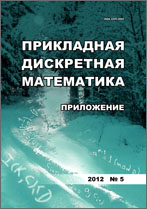|
Computational methods in discrete mathematics
On the complexity of discrete logarithm problem in a finite cyclic group with the efficient inversion
M. V. Nikolaev
Lomonosov Moscow State University, Moscow
Abstract:
Discrete logarithm problem in a finite group $G$ with the efficient inversion consists in solving the equation $Q=nP$ with respect to $n$ in the interval $(-N/2,N/2)$ for the specified $P,Q\in G$, $0<N<|G|-1$. If the inversion in the group $G$ may be computed significantly faster than the group operation, then analogously to the solution of the classical discrete logarithm, we may speed up the algorithm. In 2010, S. Galbraith and R. Ruprai proposed an algorithm solving this problem with the average complexity $(1{,}36+\mathrm o(1))\sqrt N$ of group operations in $G$ where $N\to\infty$. We show that the average complexity of the algorithm for finding the solution of the discrete logarithm problem in the interval $(-N/2,N/2)$ equals $(1+\varepsilon)\sqrt{\pi N/2}$ group operations.
Keywords:
discrete logarithm problem in interval, Gaudry–Schost algorithm.
Citation:
M. V. Nikolaev, “On the complexity of discrete logarithm problem in a finite cyclic group with the efficient inversion”, Prikl. Diskr. Mat. Suppl., 2015, no. 8, 149–151
Linking options:
https://www.mathnet.ru/eng/pdma230 https://www.mathnet.ru/eng/pdma/y2015/i8/p149
|

| Statistics & downloads: |
| Abstract page: | 140 | | Full-text PDF : | 78 | | References: | 27 |
|




 Contact us:
Contact us: Terms of Use
Terms of Use
 Registration to the website
Registration to the website Logotypes
Logotypes








 Citation in format
Citation in format 